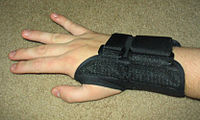
Photo from wikipedia
Because of the increasing global trend of patients with mental disorders, orthopedic surgeons are more likely to encounter orthopedic patients with mental disorders in clinical settings. Identifying the characteristics of… Click to show full abstract
Because of the increasing global trend of patients with mental disorders, orthopedic surgeons are more likely to encounter orthopedic patients with mental disorders in clinical settings. Identifying the characteristics of these patients and implementing psychiatric management can affect the clinical outcome of orthopedic treatment. Thus, orthopedic surgeons need to assess the psychiatric medical history of orthopedic patients with mental disorders before surgery and understand the psychological and behavioral patterns of patients with mental disorders. In addition, appropriate psychiatric consultations and evaluations are necessary to prevent worsening of mental disorders before and after surgery.
Journal Title: Clinics in Orthopedic Surgery
Year Published: 2022
Link to full text (if available)
Share on Social Media: Sign Up to like & get
recommendations!